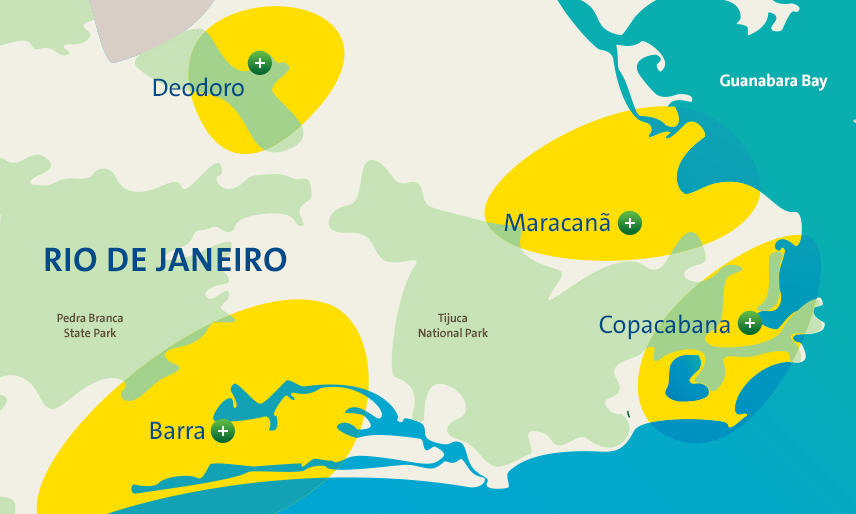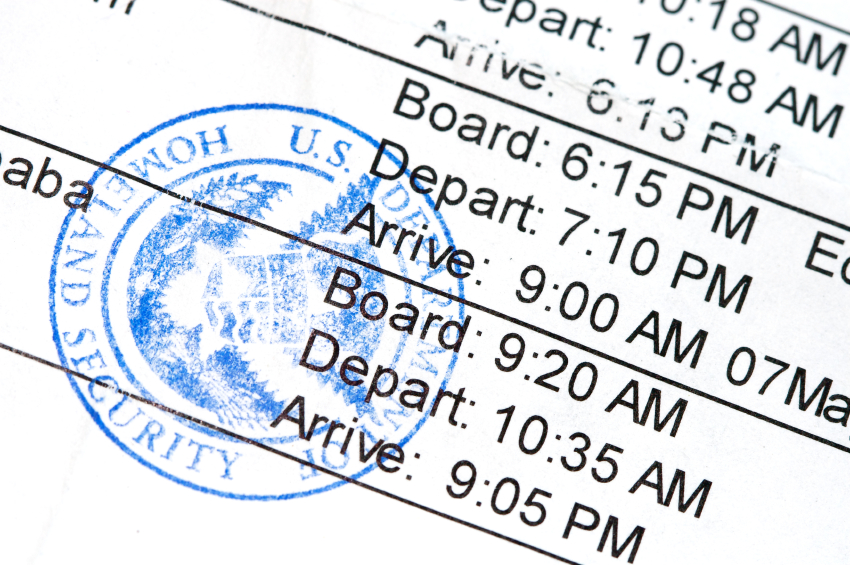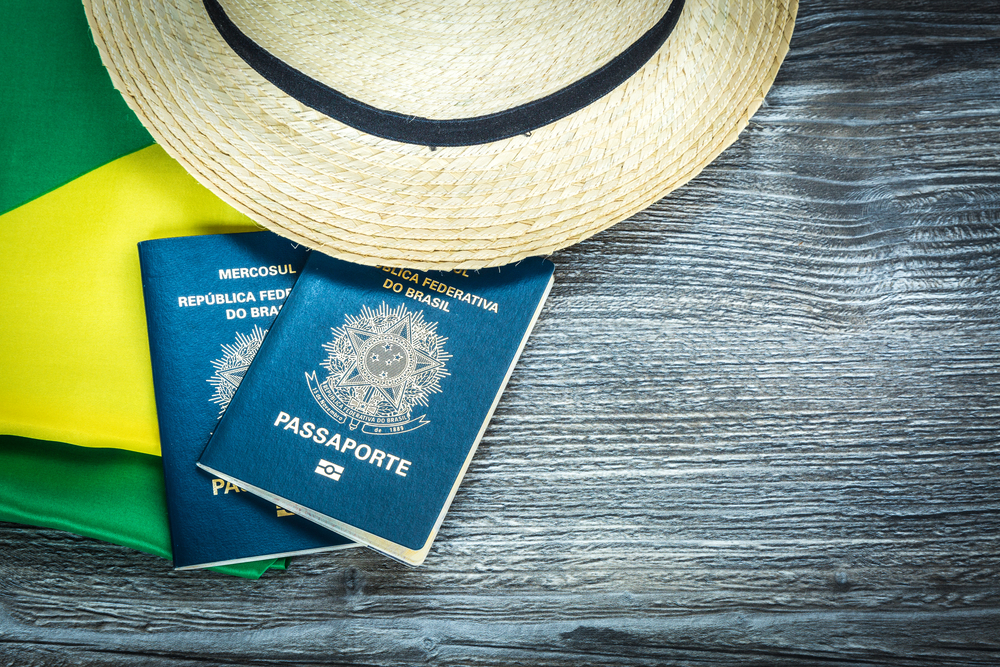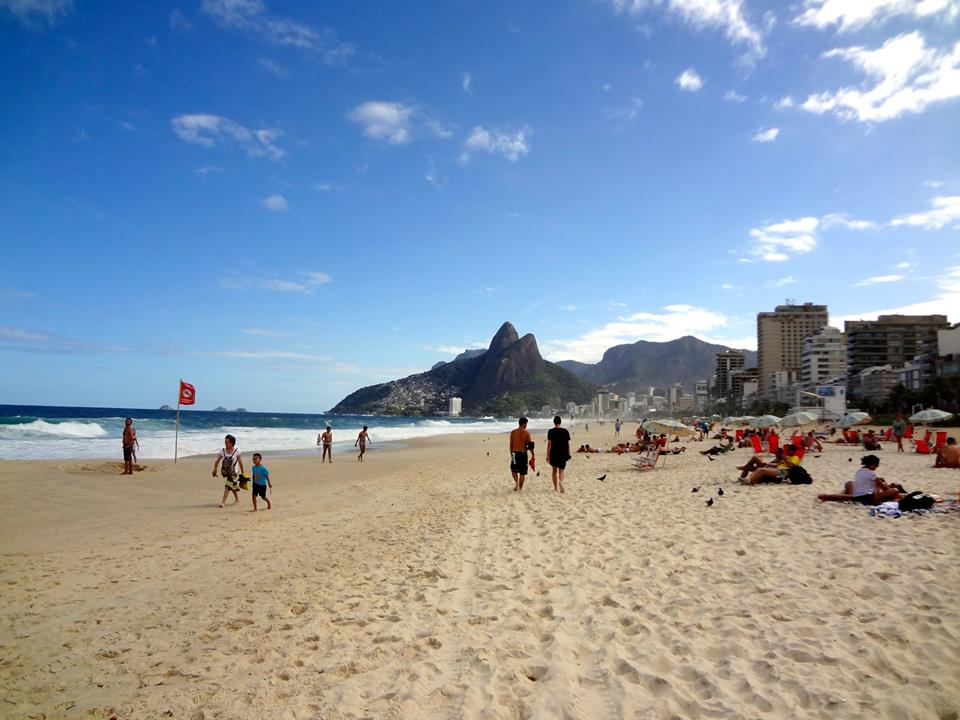
This post has been updated with information about the Zika Virus. 1/18/2016
Splendid weather, gorgeous landscapes and, of course, the 2016 Summer Olympics make Brazil a rollicking place to visit this summer. Whether you’ve been planning the trip for months or newly interested in attending but not sure where to begin, our Complete Guide to Visiting Brazil for the Summer Olympics can walk you through everything you need to know to make the most of your incredible getaway.
The Brazil Summer Olympics kick off Aug. 5 and run through Aug. 21, 2016, with more than 10,000 athletes competing from more than 200 countries. The 17-day event will feature 306 medal competitions along with the claim to fame of being the first Olympic Games to be held in South America.
Getting Your Olympic Tickets
Ordering your Brazil Summer Olympics tickets in advance through the authorized US seller of CoSport is one way to go about it, but seasoned Olympic traveler and Forbes contributor Chuck Jones says it isn’t the only way. Since ticket requests were being taken by CoSport as early as spring 2015, some of the most popular events may be tough to come by.

Another option is to try to buy tickets on-site at the events you want to see. Jones says you can show up for your desired events and look for people holding up a ticket in their hand, which typically indicates they have one for sale. You can also check for tickets for specific events on sites like eBay, provided you research the seller first, or engage in the art of trading Olympic pins.
Olympic pin trading has become a sport within itself at the games, with pins issued or for sale from various countries, companies and media sources throughout the events. Pins can be traded with other pins, or sometimes even tickets.
Taking the CoSport Route
Buying Brazil Summer Olympics tickets through CoSport simply involves heading to the website at CoSport.com and choosing from the available options. Choices include:
- Individual tickets: Select the events you want to attend and purchase tickets for those select events on a first come, first serve basis.
- Hotel and ticket packages: Take care of lodging and Olympic tickets in one fell swoop, choosing from a variety of predetermined packages or those that let you choose up to a select number of events.
- Ticket and hospitality pass packages: Purchase tickets for high-demand events combined with “memorable Rio hospitality.” We’re guessing they mean primo treatment during the event.
Brazil Summer Olympics tickets and packages will be on sale through July 1, and the sooner you can book them, the greater your choices will be.
No Regrets

Even if you can’t snag tickets to the bigger sporting events, such as swimming, diving and gymnastics, you can still have a blast checking out some of the nontraditional sports. Olympic regular Jones noted he and his family ended up having a marvelous time watching team handball, which combines baseball with rugby and soccer.
Mapping out the Olympic Venues

With more than 40 events going down during the Brazil Summer Olympics, you can bet the events are spread out across multiple venues. A total of 34 different venues are located in groups within four different zones throughout the city of Rio de Janeiro:
- Barra zone: The Barra zone sits in the southwestern part of the city and will be the main area for the Olympic Games. In addition to the Rio Olympic Park, this zone is home to the Olympic Village, Maria Lenk Aquatic Center and Olympic Aquatics Stadium.
- Copacabana zone: Known for its stretch of tourist-friendly beach, this zone is on the city’s southeastern edge. Here you’ll find Copacabana Stadium, Flemengo Park and Fort Copacabana.
- Deodoro zone: Located in the northwestern part of the city, the Deodoro zone is home to the National Equestrian Center, National Shooting Center, Olympic BMX Center and the Olympic Hockey Center. In addition to equestrian, cycling and shooting events, competitions in this zone will include modern pentathlon and fencing.
- Maracana zone: This northeastern zone has two main venues: Maracana Stadium and Sambodromo Stadium. The former is a massive tourist attraction built for the 1950 World Cup. It’s also where the Brazil Summer Olympics opening and closing ceremonies will be held.
Traveling from zone to zone can be done in private taxi or on public transportation, with routes connecting them via Brazil’s Metro, suburban railway and bus rapid transit (BRT) systems. Plan to leave plenty of time for traveling between zones, and at least 15 to 30 minutes to go through security and walk to the specific venue once you arrive in the designated zone.
Security is typically the slowest on the first day or so but speeds up notably as the Games continue and staff becomes more familiar with procedures.
Finding a Place to Stay

If you decided to go for the Olympics ticket and hotel packages, your accommodations are already set. If not, you have several options for finding a place to stay during the Brazil Summer Olympics. The events you want to stick around to see dictate the number of days and nights you’ll need to book.
While room rates in Olympic cities tend to start extremely high and then drop as they’re not filled closer to the event date, booking early and paying more may be worth the peace of mind you’ll get from knowing you have a bed in which to crash at the end of the day. Lodging options can include:
Hotels and Resorts: UK’s Telegraph made finding top-notch accommodations with a top 10 list showcasing the best Rio de Janeiro hotels that put you near the highly popular Copacabana beach. Its top picks are:
- Hotel Fasano: Gorgeous views from the rooftop pool and bar
- Hotel Santa Teresa: Packed with bohemian charm
- Belmond Copacabana Palace Hotel: Classic vibe in laid-back nabe
- La Suite by Dussol Hotel: Exclusive privacy in a seven-suite mansion
- Mama Ruisa Hotel: Tropical boutique hotel
- Casa Mosquito Hotel: Restored mansion peppered with European glamour
- Tuakaza Hotel: Unique, well-hidden hillside retreat off the beaten path
- Casa Amarelo hotel: Serene luxury mingled with high-energy urban vibes
- Pestana Rio Atlantica Hotel: Located in the middle of the beach; no further details necessary
- Pousada Jardim da Marambaia Hotel: Simple, comfortable Mediterranean-style villa
You can check out the availability of these and other hotels in and around Rio de Janeiro through sites like:
Orbitz, Expedia and similar sites often offer deals on hotel accommodations combined with flights, something to keep in mind to potentially get a discounted deal.
Apartments and rooms: If you’re staying for an extended period, or want accommodations that can include separate bedrooms and a kitchen, Airbnb.com is a place to look to rent rooms or entire apartments in somebody’s home. HomeAway.com offers bed and breakfasts and other lodging options, some of which are also in private homes.
Use common sense and your best research skills to ensure the person offering the deal is trustworthy and upfront about what you’ll be getting into.
Booking Your Flight

When booking your flight from the US to Brazil, you have a choice of two airports serving Rio de Janeiro. They are:
- Santo Dumont Airport (SDU), located in downtown Rio de Janeiro
- Galeao – Antonio Carlos Jobim International Airport (GIG), located about 12 miles from town
While SDU is a more convenient location for quickly getting to your hotel and other attractions, it handles fewer, smaller and only domestic flights. That means choosing SDU as your final destination would leave you with a stop-over at another airport in Brazil that handles international flights.
A direct flight from Miami International Airport (MIA) to GIG takes at least 8.5 hours, so your travel time could vary widely depending on your starting location. It also depends on how many layovers you get. Although you may be used to changing planes at layovers, some flights to Brazil may also require you actually change airports.
A number of airlines fly from the US to Rio de Janeiro, with the direct flights available from:
- American Airlines
- Delta Airlines
- LATAM Airline Group, operating TAM flights
- United Airlines
You can book flights on the airline websites or shop around on the same type of sites you used for booking your hotel. These include:
Check out dozens of different flight options by simply launching an online search for flights from your departing city to Rio de Janeiro.
Flight Booking Tips
Olympic traveler Jones said getting in and out of the host country is usually relatively easy – as long as you don’t attend the Olympic Closing Ceremony. He said everyone wants to leave the day after the ceremony, which means travel can be a nightmare.
You can also make the most of your stay in Brazil by arriving a few days before or leaving a few days after the events you want to see. This gives you time to explore other areas of the country while ensuring the extensive flight you took to get there was truly worthwhile.
Jones also noted flying to other cities in Brazil right before or after you hit Rio de Janeiro may make getting airline tickets easier or less expensive. Flying in or out of SDU you would also be an option in such cases.
Securing Your Travel Documents

You’re going to need a valid passport to head to Brazil, and your passport needs to be valid for at least six months after the date you enter the country. While a visa is usually required for US citizens to travel to Brazil, the Brazilian government is suspending the need for visas for select countries during the Brazil Summer Olympics and Paralympic Games. The visa waiver is expected to:
- Apply to citizens of the US, Canada, Australia and Japan
- Allow those citizens to enter the country without a visa if they enter between June 1, 2016, and Sept. 18, 2016
- Allow those travelers to stay in Brazil for up to 90 days after their arrival date
- Be in effect without the need to show Olympic tickets
Travelers holding passports from countries other than the US, Canada, Australia and Japan may still need a visa to enter Brazil. You can check countries that require visas on the Brazilian Consulate website.
Swift offers expedited visa services for Brazil for those who still require one to enter the country. We also offer expedited passport services if you need to renew your passport prior to your departure.
What Else You Need to Know

A number of other tips can help make your Brazil trip as enjoyable as possible. The official language of Brazil is Portuguese, and learning a few key phrases can go a long way. Taking online classes or even prepping with language software can also help. English is not widely spoken by the natives, and Brazilians are generally delighted when someone takes the time to learn their language.
Weather and Packing
Even though the Brazil Summer Olympics are being held during the country’s winter, you certainly don’t need to pack your snow boots. Temperatures in August and September typically hit a high of 76 degrees Fahrenheit, with a low of 64.
You’ll want comfortable, lightweight clothing for your trip, along with a sturdy pair of walking shoes. Bring a mix of long-sleeve and short-sleeved shirts you can layer and remove as needed. Jeans are a staple that’ll help you blend in with the locals. And if you’re heading to Rio’s world-renown beaches, don’t forget your bathing suit!
Health and Safety
The Centers for Disease Control and Prevention recommends all travelers to Brazil are up-to-date on routine vaccinations. Routine adult vaccinations include:
- Flu
- Hepatitis A
- Hepatitis B
- HPV
- Meningococcal
- Pneumococcal
- Shingles
- Td: Tetanus, Diphtheria
- Tdap: Tetanus, Diphtheria, Pertussis
Typhoid vaccinations are also recommended for visiting any part of Brazil, while additional vaccinations are recommended if you’re heading to other areas of the country beyond Rio de Janeiro. You can check out all the recommendations at the CDC’s page on Health Information for Travelers to Brazil.
Pay a visit to your doctor four to six weeks prior to your trip to get updated with any vaccinations you may be lacking.
Typhoid and Hepatitis A can be spread through contaminated food and water, making it essential you pay attention to what you eat and drink during your trip. Stick with bottled water only for any drinking or cooking purposes.
A January 2016 alert has also warned travelers the country has recently experienced an outbreak of the Zika virus, which is spread by mosquitoes. Pregnant women are advised to exercise extreme caution as the infection may affect newborns. The Zika virus does not have an available vaccine, and the best defense may be mosquito repellant and steering clear of mosquito-infested areas.
Zika Virus
This virus, becoming world news in January 2016, is the latest travel health concern and for good reason. While it doesn’t appear to be effecting adults other than flu-like symptoms, babies that have been born to mothers carrying the virus have microcephaly, a condition where the head is much smaller than expected.
The government is advising pregnant women against traveling to countries affected by the virus, including Brazil. To learn more about precautions you can take and what to do, visit the Center for Disease Control and Prevention.
Security and Getting Around
Rio de Janeiro is bracing for the Brazil Summer Olympics crowd with a massive security staff of 85,000 personnel and a keen focus three key areas: street crime, terrorism and stadiums.
More than 45,000 security personnel will be patrolling the streets for two weeks during the games, while an integrated city center will be established to prevent terrorist attacks. You’ll be asked to go through metal detectors and X-ray machines before entering any stadiums, which will be manned by prison employees and unarmed soldiers.
Common sense can go far when traveling through Brazil, or any foreign country, as can doing your best not to call attention to yourself as a tourist. Examine your maps in the safety of your hotel room, dress like the locals, and keep flashy jewelry and electronics out of sight. Better yet, keep them at home.
Make two color copies of your passport and other important travel documents. Leave one set back in the US and bring another with you. Carrying identification is required in Brazil, so trek around town with a copy of your passport, leaving the original locked up in your hotel safe.
Fight the urge to walk around with your smartphone in hand, as it can easily be snatched. Take only as much cash as you’ll need for the day’s activities, keeping the rest with your passport in your hotel safe. Most restaurants and even some taxis accept credit cards.
If you do need cash while you’re out and about, opt for an ATM in a mall, center square or other highly populated area. Brazil’s currency is the real (BRL), and one real was worth about 25 US cents as of January 2016.
Crime in Brazil can happen anywhere, not just the middle of a crowded city. The US Department of State reports attacks around major tourist attractions, including trails leading to the Corcovado Mountain and in other areas of the Tijuca Forest.
If you are approached by thieves, relinquishing your belongings is the safest action to take. Keeping your money, credit cards and other valuables spread out in different pockets may help, as may creating a decoy wallet that contains expired credit cards and a few dollars you can hand over to quell any would-be thieves.
Traveling in groups, especially at night, is recommended. Staying off the streets at night entirely is an even better idea. You’ll also want to keep an eye on any drinks you may be enjoying out in public, as there have been reports of people slipping drugs into drinks at bars, street parties and hotel rooms.
While Brazilian slums, known as favelas, pique the curiosity of many US tourists, they are definitely not the safest places to visit – especially on your own. Even favelas that have been designated as “pacified” and supposedly have police protection only enjoy a limited amount of that protection. If possible, track favelas on your map and steer clear of those areas if you happen to be roaming about.
Public transportation is widely available throughout the city, but a safer option is a taxicab. Be wary of hailing random cabs off the street, instead sticking with official cabs you can call for in advance or recognize by distinct identifiers. Official yellow taxis will have a license posted behind the windshield and a red license plate. Be wary of sharing a cab with strangers, and never accept any rides from private vans.
One more item of note in Rio de Janeiro is the possibility of manhole cover explosions. Several have been reported over the last few years, particularly in the Copacabana and Centro neighborhoods.
What (Else) to do for Fun

In addition to the major attraction of the Brazil Summer Olympics Games, you’ll find plenty of amazing things to do and see in and around Rio de Janeiro. The famed beaches of Copacabana and Ipanema are two of them, while Sugarloaf Mountain is a third.
Tijuca National Park is home to what remains of the lush rainforest that once encompassed the entire city, and it’s also where you’ll find the Corcovado Mountain. Climb to the top and you’ll get a close-up of a striking, 124-foot-tall carved statue of Christ the Redeemer, or Cristo Rendentor, that is lit up and visible at night from nearly every corner of the city.

Rio is also peppered with numerous historical sites, a wide range of restaurants and a vibrant nightlife. The Rio2016 site breaks down city attractions by the four zones where the Olympic Games are being held for an easy way to find something close to the events you’re planning to attend.
Checking out Rio’s local sights during the Brazil Summer Olympics can be ideal, since most tourists and locals in town will be focusing solely on the games. Local restaurants that are off the beaten paths of Olympic venues are also likely to have plenty of seating.
Ready for Fun
Once your Brazil Summer Olympics tickets are booked, your hotel room reserved, your flight scheduled and your paperwork and vaccinations in order, the only thing left for you to do is hop on your plane and get ready for some fun. The host country of Brazil started planning for the phenomenal event back in August 2014, but hopefully our guide can help you complete everything you need a tad more quickly.
If there’s anything we left out, or if you still have questions about traveling to the Brazil Summer Olympics, please contact us. We’re always happy to help!

